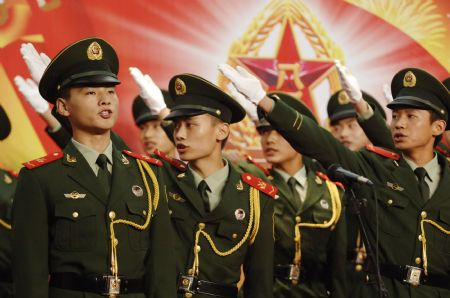
Practical information

La proximité historique du Parti Communiste Chinois et de l’Armée Populaire de Libération qui l’a amené au pouvoir en 1949 a résisté aux crises et changements les plus dramatiques qu’a connu le régime, depuis la contestation de Tiananmen en 1989 jusqu’à la libéralisation progressive de la société et de l’économie chinoises à la fin du XXème siècle. La pérennité de cette connexion unique tient à la volonté du parti de maintenir l’armée au cœur de l’idéologie du régime et de l’intégrer aux structures locales du gouvernement. La politisation des troupes, à la fois dans leur endoctrinement et dans leurs fonctions intérieures, est la pierre de touche qui permet de comprendre comment s’élabore la notion de sécurité nationale en Chine.
Juliette Genevaz est chercheur post-doc (TAPIR) au sein du Centre Asie de l'Ifri et docteur en sciences politiques de l’Université d’Oxford (2013).
Participation sur invitation uniquement.
Speakers
Find out more
Nationalismes en Chine et au Japon et implications pour les relations bilatérales
Le facteur nationaliste apparaît comme une composante importante des frictions grandissantes opposant la Chine et le Japon.

Abe’s Japan and Xi’s China: from Cold Peace to Hot War?
Sino-Japanese relations have deteriorated since Shinzo Abe and Xi Jinping came to power.

Asia-Pacific: China’s Foreign Policy Priority
China is increasingly active in the Asia-Pacific region, an area that makes up the main focus of its foreign policy.
Other events

Paris Naval Conference 2026: Naval Rearmament and Operations in Contested Waters
This fourth edition of the Paris Naval Conference (CNP), bringing together high-level military, industrial, and academic speakers, will address the challenges associated with general naval rearmament and naval operations in increasingly contested environments.

Is Fusion Coming Faster and Cheaper than Expected?
ITER was for long time the embodiment of fusion as an international, long standing R&D cooperation objective to seek a new way to produce safe, low carbon and abundant low carbon electricity. Yet over past years, fusion start ups, several governments and investors have decided to push fusion R&D and deployment to complement ITER. Major efforts are ongoing notably in the United States, China, Germany, Italy.

EV Supply Chains for Japan and Europe: Strengthening Economic Security
Economic security aims to ensure the resilience of supply chains for key industries: the case of electric vehicle production in Japan and Europe will be discussed.









